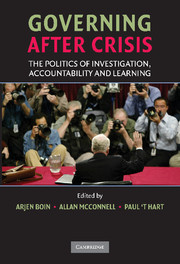Book contents
- Frontmatter
- Contents
- List of illustrations
- List of tables
- Contributors
- Introduction
- Part I Crisis-induced accountability
- Part II Crisis-induced policy change and learning
- 7 The 1975 Stockholm embassy seizure: crisis and the absence of reform
- 8 The Walkerton water tragedy and the Jerusalem banquet hall collapse: regulatory failure and policy change
- 9 Learning from crisis: NASA and the Challenger disaster
- 10 September 11 and postcrisis investigation: exploring the role and impact of the 9/11 Commission
- Conclusion
- Index
- References
10 - September 11 and postcrisis investigation: exploring the role and impact of the 9/11 Commission
Published online by Cambridge University Press: 04 June 2010
- Frontmatter
- Contents
- List of illustrations
- List of tables
- Contributors
- Introduction
- Part I Crisis-induced accountability
- Part II Crisis-induced policy change and learning
- 7 The 1975 Stockholm embassy seizure: crisis and the absence of reform
- 8 The Walkerton water tragedy and the Jerusalem banquet hall collapse: regulatory failure and policy change
- 9 Learning from crisis: NASA and the Challenger disaster
- 10 September 11 and postcrisis investigation: exploring the role and impact of the 9/11 Commission
- Conclusion
- Index
- References
Summary
Postcrisis politics and reform: the remarkable role of the 9/11 Commission
Launching an official investigation almost seems a Pavlovian response to crises in western democracies. Well-known examples include the Roberts Commission after Pearl Harbor (1941), the Warren Commission after the assassination of John F. Kennedy (1963), the Ervin Committee after Watergate (1972), the Widgery and Saville Inquiries after Bloody Sunday (1972), the Scarman Inquiry after the Brixton riots in London (1981), the Challenger and Columbia commissions (1986/2003), the Dutch NIOD Inquiry after the fall of the Bosnian Muslim enclave of Srebrenica (1995), the Dutroux inquiry (Staelraeve and 't Hart, this volume), the Swiss Independent Expert Commission on the role of Swiss banks during World War II (1996) and the Spanish Parliamentary Inquiry after the terrorist attacks in Madrid (2004).
Whereas the establishment of postcrisis inquiries is a recurring pattern, their political impact varies significantly. Some commission reports set off substantive policy changes; others end up in the dustbin. In fact, when it comes to enacting meaningful reform, the latter outcome (the dustbin) appears to be the norm. Postcrisis commissions rarely result in dramatic change or substantial reform (March and Olsen 1983; Olsen and Peters 1996; Zegart 2005). The persistence of formal postcrisis inquiries, despite a seeming record of desultory results, raises two key questions: what motivates such efforts and why do some commissions have a major impact on policies, while others pass into oblivion?
- Type
- Chapter
- Information
- Governing after CrisisThe Politics of Investigation, Accountability and Learning, pp. 255 - 282Publisher: Cambridge University PressPrint publication year: 2008
References
- 21
- Cited by



